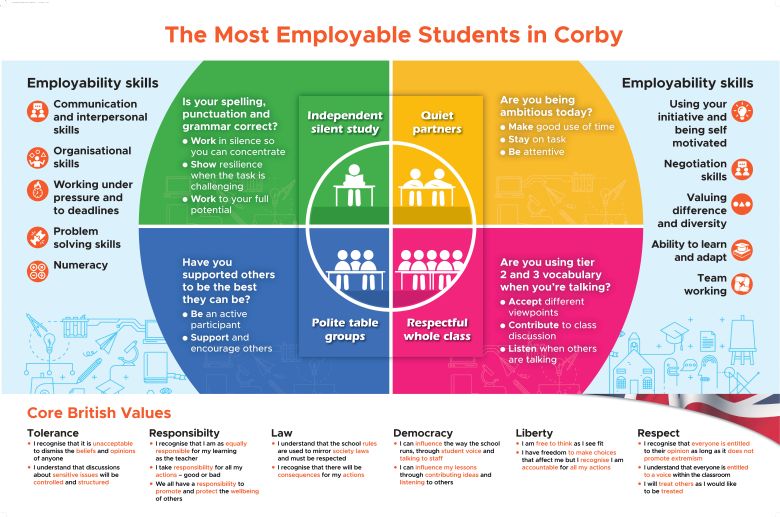Employability Skills
The most employable students in Corby
We firmly believe that all students need to be equipped with the employability skills that will enable them to succeed in a fast changing global market and foster adaptability so that students can transfer their skills into new environments.
Employability depends on your knowledge, skills and attitudes, how you use those assets, and how you present them to employers.
The following display is visible at the front of every classroom, to help teachers and students to make links to employability skills in subjects across the whole curriculum:

‘As part of our careers programme, students have a designated time each week to develop key employability skills to prepare them for the world of work and future careers. In all lessons we expect students to be provided with opportunities to develop these personal qualities, this may be through group work, organising teams, presenting to the class, meeting deadlines and evaluating their own and others work.’
The table below outlines the employability skills and how teachers develop these in lessons:
|
Skills that employers want |
What that means |
Developing skills in lessons |
|
Communication and interpersonal skills |
The ability to explain what you mean in a clear and concise way through written and spoken means. To listen and relate to other people, and to act upon key information / instructions. |
Presenting findings to the class Being the spokesperson for a team Developing debating skills Focus on student’s verbal responses to questioning |
|
Problem solving skills |
The ability to understand a problem by breaking it down into smaller parts, and identifying the key issues, implications and identifying solutions. To apply your knowledge from many different areas to solving a task. |
Use open ended tasks that may have multiple solutions. Encouraging students to be resilient if they don’t succeed the first time with something. Demonstrating that there may be more than one way to solve a problem. |
|
Using your initiative and being self-motivated |
Having new ideas of your own which can be made into a reality. Showing a strong personal drive and not waiting to be told to do things. |
Use creative tasks to generate the development of ideas. Encourage students to follow personal interests. Teach research skills and develop independence. Celebrate student’s achievement outside of school Facilitate student involvement in wider school life |
|
Working under pressure and to deadlines |
Handling stress that comes with deadlines and ensuring that you meet them. |
Teach students how to plan a project or piece of work, setting milestones to completion. Model planning revision. In lessons give student time limits for the completion of tasks. Discuss the importance of meeting deadlines |
|
Organisational skills |
Being organised and methodical. Able to plan work to meet deadlines and targets. Monitoring progress of work to ensure you are on track to meeting a deadline. |
Provide opportunities for students to organise themselves and others. Delegate tasks to students so that they learn how to take responsibility. Support students in acting as leaders within the class / year group / whole school
|
|
Team working |
Working well with other people from different disciplines, backgrounds, and expertise to accomplish a task or goal. |
Incorporate pair and group work into lessons, initially students will need guidance on how to organise themselves and roles designated. Provide opportunities for students to form their own groups and delegate out tasks.
|
|
Ability to learn and adapt |
To be enthusiastic about your work, and to identify ways to learn from your mistakes for the benefit of both you and your employer. |
Help students to engage with feedback provided in lessons and support them to act on this to improve their work. Remind students of common misconceptions so that they can avoid them. Provide opportunities for students to evaluate their own work and redesign or redraft work to improve it. Teach students how to feedback to one another so that they become expert at critically evaluating each other’s work |
|
Numeracy |
The ability to use data and mathematics to support evidence or demonstrate a point. |
Ensure that numeracy is taught consistently across the school following the numeracy guidance. In all lessons give students the opportunity to practice their mathematical skills to solve problems. Emphasis where you are using numeracy in your subject area. |
|
Valuing diversity and difference |
Knowing the value of diversity and what it can bring. Understanding and being considerate of the different needs of different individuals. |
Working with a range of different students during group work Exploit opportunities to introduce student to different cultures and draw parallels with their own. Increase awareness of diversity |
|
Negotiation skills |
To take on board other people’s feelings and express your own requirements in an unemotional clear fashion to achieve a win-win outcome. |
Deciding what roles to take in group work Debating issues in class. Being able to appreciate a differing viewpoint Formulating an opposing point of view and expressing it coherently. |